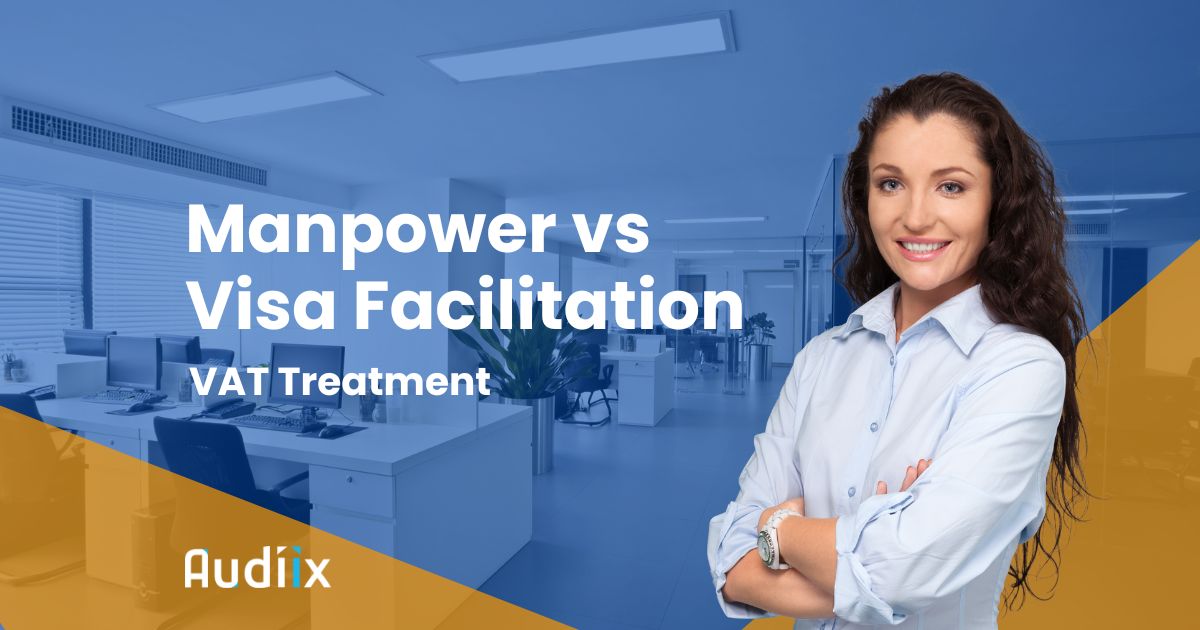Manpower vs Visa Facilitation services

Ensuring VAT Compliance When Employees Hold Visas from Another Company
The Federal Tax Authority has released a public clarification on the treatment of Manpower services vs Visa Facilitation services (VATP038) on 31 May 2024.
It is common practice in the UAE, especially among related companies, for one company to hold the employment visas while the employees work under the supervision and control of another entity. From a VAT perspective, these services can either be classified as manpower services or visa facilitation services. Differentiating between these two is crucial due to their distinct VAT treatments.
The challenge for UAE businesses lies in determining the nature of the service, the value of the service, and whether to charge VAT, especially when the businesses are part of the same corporate group.
In this tax alert, we will explain the difference between manpower and visa facilitation services, and how to determine the value and VAT treatment of such services.
Manpower Services
Manpower services encompass identifying, recruiting, and hiring candidates to make them available for work at another entity. Typically, the supplier (sponsor) bears all employment obligations, including salary and benefits.
Generally, the default classification of such supply is manpower service, and VAT must be charged accordingly. However, as an exception, if certain conditions are met, the supply will be treated as a facilitation service, which has a different VAT treatment.
Value of Supply:
The total value of the supply subject to VAT for Manpower Services includes:
- Services and fees related to visa provision.
- Employee salaries and benefits, whether recharged to the customer or directly paid to employees.
In this case, the supplier of manpower services must charge VAT on the total value of the supply, including salaries and benefits.
Visa Facilitation Services
A service qualifies as visa facilitation, not manpower, if it meets specific criteria. These services are usually within the same corporate group.
Criteria for Visa Facilitation Services:
- The sponsor (facilitator) and the customer are part of the same corporate group.
- The facilitator’s business activities do NOT include manpower supply as per their license and practiced activities.
- The facilitator is not responsible for any employment obligations (including HR services).
- Employees sponsored by the facilitator work exclusively under the customer’s supervision and control.
Value of Supply:
For VAT purposes, the value of visa facilitation services includes:
- Charges for services like typing fees, medical tests, and issuance of Emirates IDs.
- Excludes employee salaries, annual flight allowances, and other monetary benefits, which are the customer’s obligations.
In this case, the supplier of Visa Facilitation Service must charge VAT on the visa and Emirates ID fees & expenses.
Special Valuation Rules
Special valuation rules apply for supplies between related parties and supplies made free of charge.
If the facilitator charges a fee that is less than market value and the other entity is not entitled to full input recovery, the value of the service is the market value. Thus, the facilitator is required to impose VAT on the market value.
If the facilitator provides the visa facilitation services free of charge, the supply would constitute a deemed supply, so the special VAT rules for this type of supply apply.
Implications for VAT Group
When the facilitator and the customer are part of a VAT group, they are considered the same entity. Consequently, no supply is made, and the activity falls outside the scope of VAT.
Conclusion
The exception for visa facilitation services and the exclusion of employee salaries and benefits from the value of supply are welcome developments, especially for related companies and corporate groups. Companies with similar arrangements must assess these transactions and apply the correct VAT treatment.

